What To Say When Someone Dies – Do’s And Don’ts
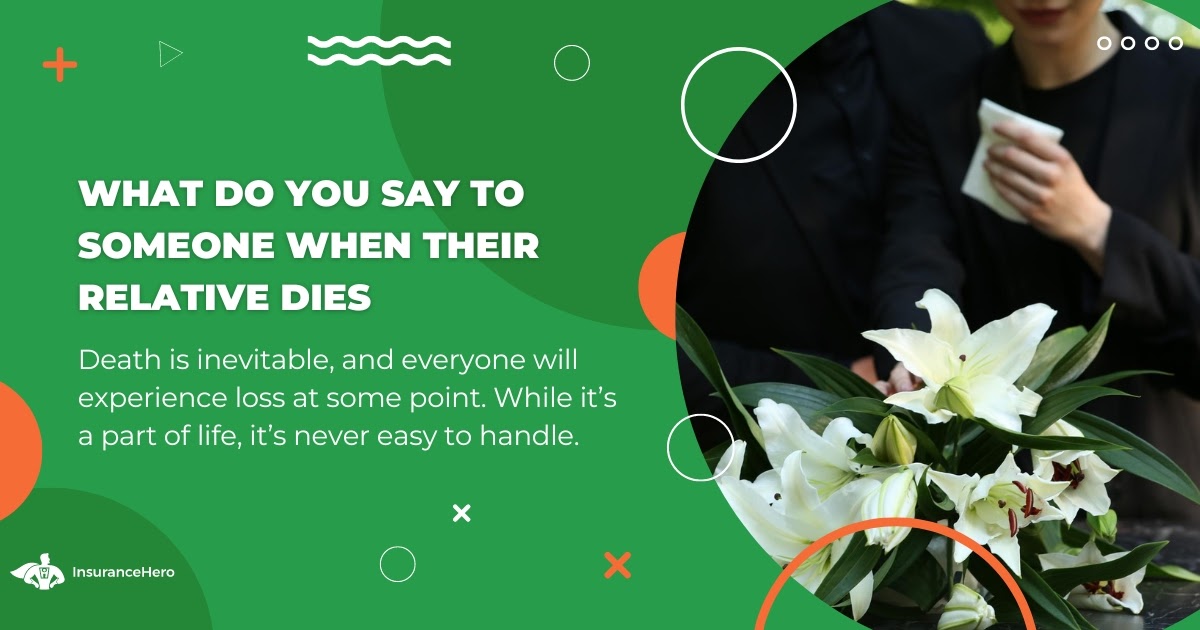
Death is one of the few inevitabilities of life. There’s no way to avoid it; everyone will experience loss sooner or later.
However, knowing what to say when someone dies is one of life’s challenging situations.
Despite being a fact of life, it’s not necessarily easy to handle. Loss is difficult when you’re experiencing it, but it can also be hard if you’re standing by as someone you know, love, and trust is experiencing a loss of their own.
So, whether a spouse’s parent has passed, a friend’s spouse has died, or the loved one of an acquaintance has met their end, you need to understand how to deal with the situation.
What To Say When A Friend, Family Member, Or Relative Dies – Summary:
Death is inevitable, yet knowing how to respond when someone you care about loses a relative can be tough.
Supporting someone during their grief is about understanding their needs and being there for them.
Here’s why it’s worth considering:
- Carefully Choose Your Response: Consider the depth of your relationship to decide how best to support the grieving person, whether by offering help or simply providing a comforting presence.
- Focus on Them: It’s important not to make their loss about your own experiences – keep the focus on them and their needs.
- Be Sensitive to Their Culture: Different cultures and religions have unique ways of mourning. Be aware of these so you can offer appropriate and respectful support.
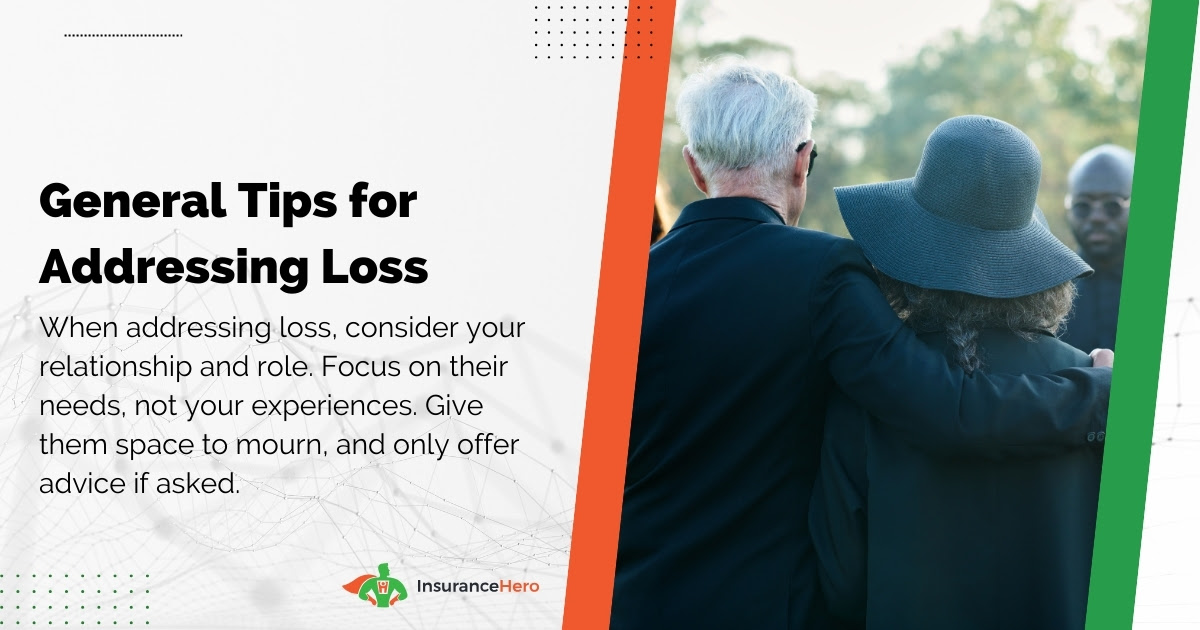
General Tips for Addressing Loss
Before we discuss specific things you can say, let’s discuss some of our more general tips and recommendations.
Consider your relationship
One of the most important things to do when someone you know is experiencing a loss is to consider your relationship with them and what your role might be. Is this a time to step up as a friend and help take care of basic elements of life for them while they mourn?
Is your relationship distant enough that your primary role is to provide sympathy and, more importantly, continued normalcy? If this is a close relationship like a spouse or other family member, you’re much closer to them than you would be otherwise.
Don’t divert the focus
One of the most common sources of conflict during this time is a difference in how people communicate. Some people can offer condolences and move on.
Others find it best to mention a similar loss they experienced to establish common ground and express sympathy. The trouble is that people who aren’t in that second group tend to find that group to be abrasive.
When you don’t establish sympathy in the same way, it can feel like someone is trying to “make it about themselves” in a way that feels diminishing.
If you can, try to understand the person you’re consoling’s communication style and whether a simple platitude is all they need or if a deeper conversation is more appropriate.
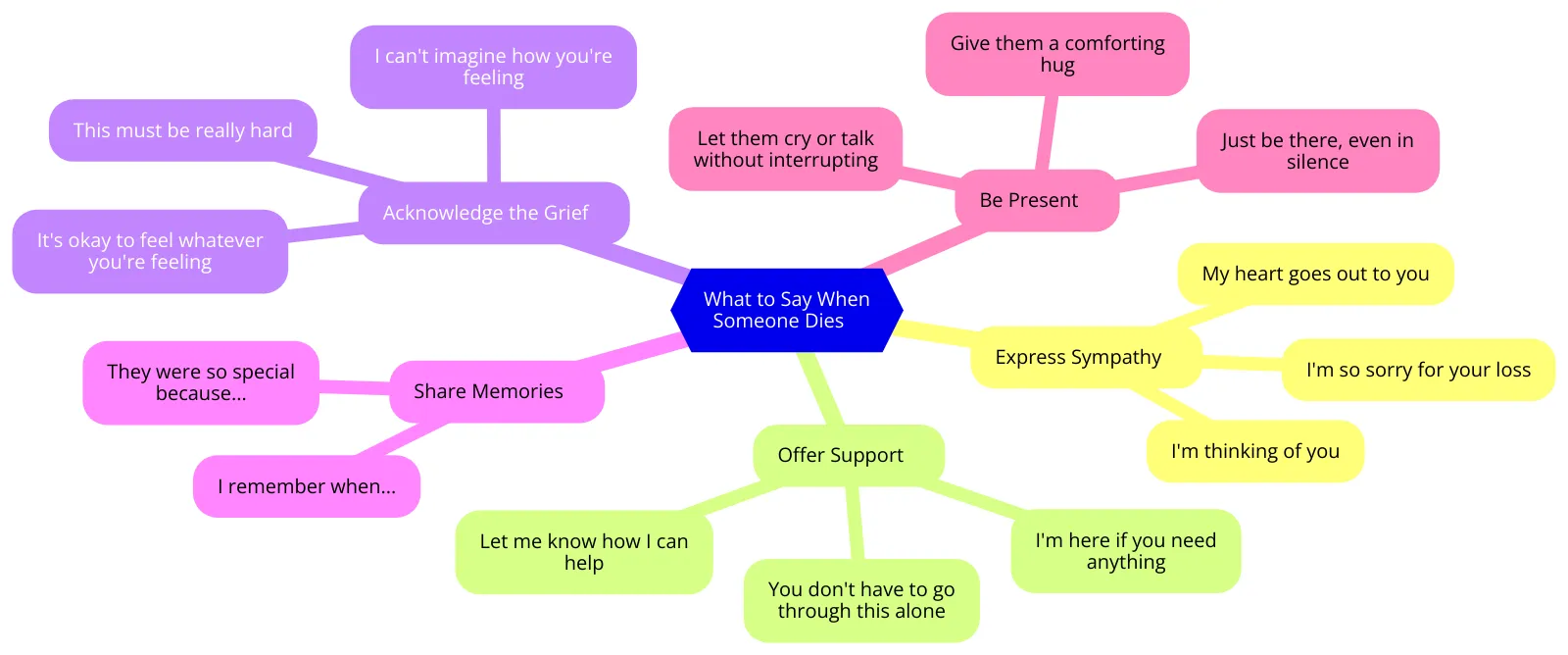
Leave time and space to mourn
Another common conflict in modern communications arises between people who simply want to talk and those who want to solve a problem.
Mourning the loss of a loved one isn’t something you can “solve,” but some people tend to jump into a solutions-oriented discussion immediately.
Consider whether the person you’re consoling is in a state of mind that requires tips and solutions to help them accept the loss or if they simply want to talk, reminisce, and mourn.
Even asking, “Do you want tips or just to talk?” can be a good way to establish boundaries.
Don’t make promises you can’t keep
This one is a little less likely to be an issue, but consider the words you say and what they mean. If someone is in mourning and you tell them you’ll be there for them, it only serves to hurt them more if they come to call on you and you aren’t around.
You may need to sacrifice plans or make room in a busy schedule if you want to live up to the things you say. Otherwise, don’t say them.
Consider cultural attitudes toward death
While here in the UK, we often have a very Western view of death and the sense of loss and grief that accompanies it, other societies have different attitudes.
To some, the end of life, no matter how tragic, is an opportunity to celebrate their life rather than mourn their death.
Others, particularly among some religions, find death to be one step on a journey and don’t place as much attachment on one stage of life versus another.
Consider whether the person you’re consoling wants to participate in these kinds of rituals or if they have their own way, or a different way, to mourn, celebrate, and grow beyond the event itself. Who knows, maybe you’ll pick up a new life philosophy along the way.
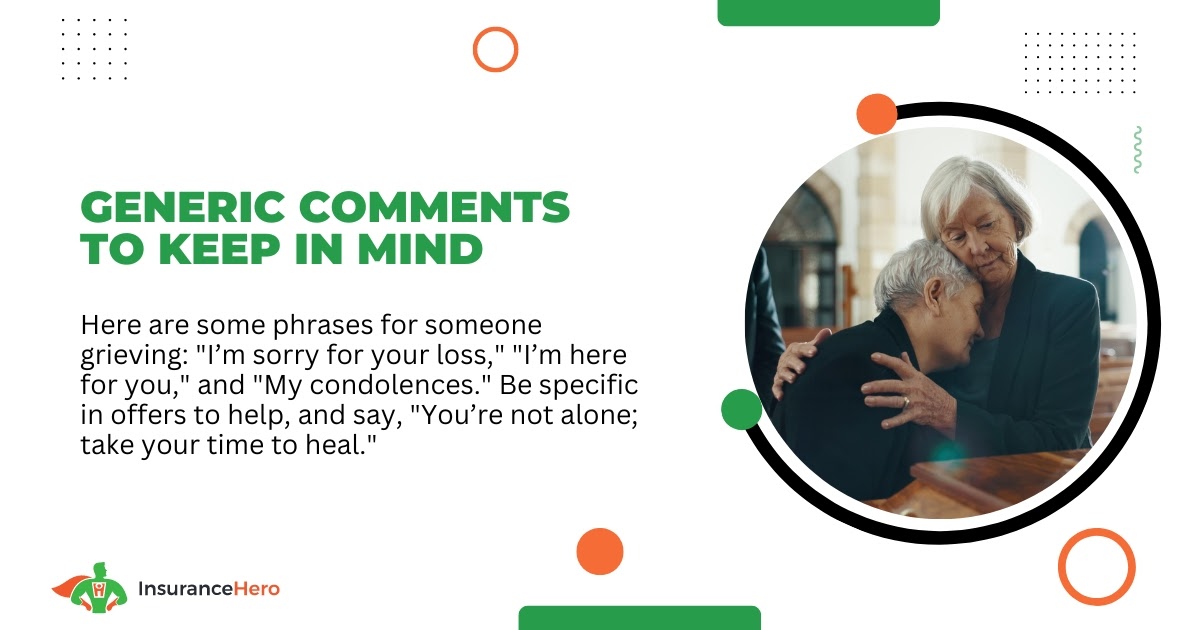
Generic Comments to Keep in Mind
Now, let’s discuss a few of the things you might say to someone you know who is going through the grieving process. These are very general, so they can be used in almost any situation.
“I’m sorry for your loss”
This one is a classic, suitable for any loss, though it can feel very flat and noncommittal depending on the kind of attachment the person had and the kind of friendship you have with them.
“I’m here for you if you need me”
Extending an offer of aid is a token courtesy, but it’s tricky if you can’t live up to it. Other general sayings might include “Reach out if you need anything” and similar statements.
Tip: If you genuinely want to help and take tangible action, don’t use a generic statement like this. Instead, think about something the individual might need and how you can help them with it.
Sometimes, that means coming to their house and helping clean, cook, or handle children. It might also mean helping with grocery shopping.
Sometimes, it’s just about taking the individual out to visit landmarks and memorable places so they can move on. Offering something more tangible and specific can help more than a platitude.
“My condolences on their passing. May their memory bring you comfort”
This one is best used if the person who passed was a force for good in the life of the person you’re consoling. If you’re unsure what kind of relationship they had, perhaps consider how strongly you want to imply their good traits.
“You’re not alone; take all the time you need to heal”
Sometimes, the loss of a loved one is a wound that requires a long time to heal. Other times, it may never fully go away. At the same time, some losses are more quickly forgotten than you might think.
Either way, this platitude is usually best from someone in a position of authority, such as if you’re saying it to an employee or partner whose burden you can alleviate simultaneously.

Specific Comments for Specific Losses
If you want to say something a little less generic, here are some specific situations and what you might say for them.
“The love you shared was incredible”
If someone loses their spouse, it can be a profound loss that no one expects to experience until very late in their lives. This is doubly true if the loss is dramatic or unexpected, such as an accident or sudden illness.
In these times, memorialising the relationship they share can be a powerful way to offer your sympathies.
“They were an amazing parent and did well with you”
When someone loses a parent, offering your sympathies and praise for how they raised your friend can be a potent comment.
This one is tricky, though, because you don’t want to assume too much. Your friend may have had a contentious or troubled relationship, and casting it in too positive light can be negative.
“There are no words. A parent should never have to go through this”
If someone loses a child, no matter how much foreknowledge they had (such as in a childhood leukaemia or other disease), it’s possibly the most devastating thing that can happen to them.
No parent expects to outlive their children, and it’s terrible when it happens. Sincere, strong condolences – and tangible assistance – are about the only thing you can do.
“I know you were close with them. I’ll always remember X”
If someone loses a mutual friend and you aren’t as close to them, you can share a memory or attribute you remember and offer your condolences.
Of course, if you were just as good a friend, you wouldn’t need any condolences; mutual sympathies are much more critical. Consider doing something in their memory.
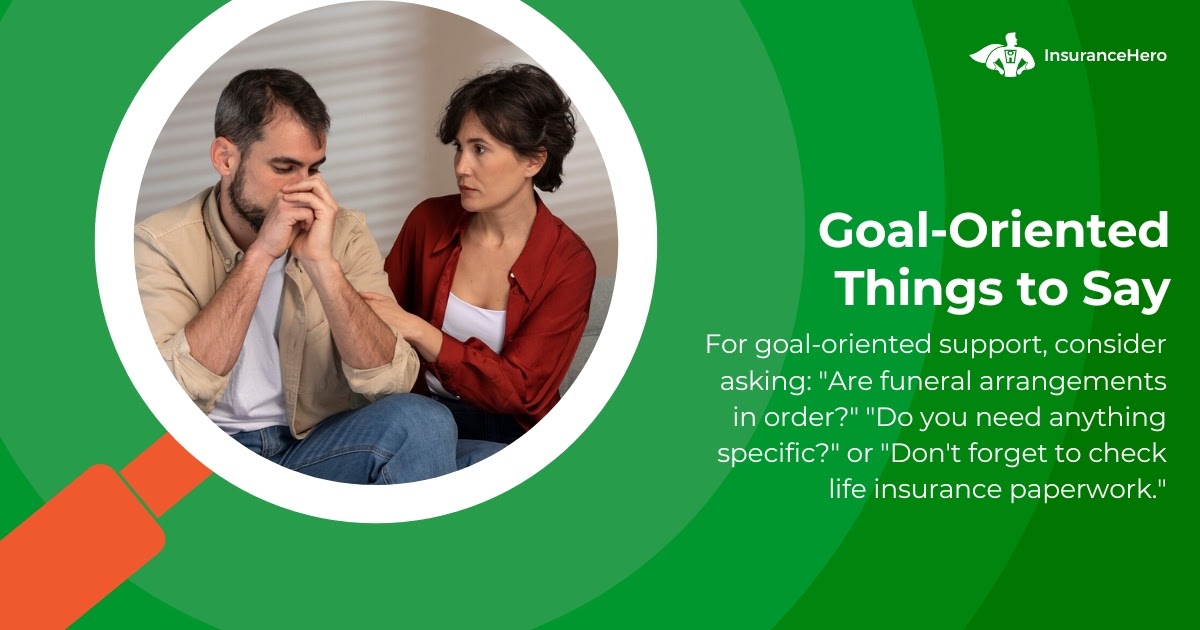
Goal-Oriented Things to Say
Now, we can discuss a few things you might say if you want to tangibly help out with the situation, at least make things easier, or remind them of things they might need to do.
“Are funeral arrangements in order?”
This is a simple question, but it’s not something you should ask too soon after the loss. It’s important to make funeral arrangements immediately, but they can also be costly and stressful if they aren’t prearranged.
If you have gone through the process before – especially if you have connections with funeral homes and other services – you might be able to offer assistance.
“Do you need X, Y, or Z?”
In this case, the variables can refer to anything you’re willing and able to provide for this person. Maybe that means a home-cooked meal and some time with friends.
Maybe it means caring for the kids, doing the laundry, or keeping things tidy. Maybe it means taking over some duties at work so they can rest easy and take some time off. Whatever the case, make sure the offer is genuine.
“Don’t forget to check for life insurance paperwork”
There are two important caveats to this one. The first is that the person who lost their loved one must be in a position to be a beneficiary.
Telling someone to think about life insurance when the person who passed wouldn’t have given it to them anyway won’t help. The second is that you should probably wait until after the death to bring it up.
It can come across as ghoulish or profit-seeking to bring up money while the wound is still raw.

What Not to Say
Unfortunately, there are always opportunities to put your foot firmly in your mouth when talking to someone about loss. You never quite know what they’re going through, how they feel about it, and how they might respond to what you say.
This is why many things we and other guides recommend saying are platitudes. Something safe or easy is better than something risky that can trigger heightened emotions.
“I know what you’re going through.”
True, perhaps you’ve experienced loss, and maybe even the same kind of loss, such as the loss of a parent. However, that doesn’t necessarily mean that saying so will be helpful.
Some people find comfort in the fact that they aren’t alone, but others feel diminished by having that fact pointed out, and it can cause conflict that can end relationships.
“You’ll find someone else”
If someone loses a spouse, the idea that they’ll be able to move on is often unthinkable. And, sure, while they might be able to move on and find someone else to fill the gap years down the road, that doesn’t mean they want to think about it.
Moreover, some people never do, and that’s fine too.
“I didn’t reach out because I figured you’d rather be alone.”
Yes, when someone experiences loss, they often feel like they want to be alone so they can process the overwhelming emotions they feel.
They may even turn away any offers of help and lash out at people who are too pushy about it. However, it’s also easy to feel abandoned, especially if a close friend or family member you were counting on doesn’t offer their support or reach out.
“At least you still have X”
Telling someone at least they still have, say, their children when their spouse passes, or their father when their mother passes, or another such comparison, is demeaning and trivializes the loss.
No loss is less than any other, and diminishing their loss – especially in this way, where it feels like a comparison between you and how you’ve had it worse – is bad.
Trusted Organisations That Can Help
- Samaritans: https://www.samaritans.org/
- Suicide Bereavement (SOBSUK): https://uksobs.org/
- CRUSE Bereavement: http://www.cruse.org.uk/
- Manda Centre: https://www.themandacentre.co.uk/
Steve Case is a seasoned professional in the UK financial services and insurance industry, with over twenty years of experience. At Insurance Hero, Steve is known for his ability to simplify complex insurance topics, making them accessible to a broad audience. His focus on clear, practical advice and customer service excellence has established him as a respected leader in the field.


